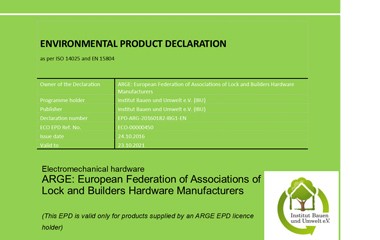
dhf (Door & Hardware Federation) is emphasising the increasing importance of EPD to the construction industry – and in particular - architects, builders and specifiers, in meeting the growing requirements relating to the sustainable building process. An EPD (Environmental Product Declaration) is a registered and independently verified document that communicates standardised, comparable information about the life-cycle environmental impact of products. In brief, it measures the environmental ‘footprint’ of a product.
Providing manufacturers with a means of demonstrating their product’s sustainability credentials, EPD’s show the results of a Life Cycle Assessment (LCA), detailing ‘cradle to grave’ environmental impact of all processes involved with the manufacture of a product. This can include extraction and processing of raw materials, transport, all elements of the manufacturing process, dismantling and waste disposal.
In recent years, there has been an increasing growth of the green agenda, with more EU governments committed to reducing CO₂ and a greater demand for green certification. Commercially, there are also significant advantages to green certification, such as helping developers to let buildings more quickly, with considerable operational cost advantages and positive financial impact. Since 1990, BREEAM has certified 561,200 developments globally, demonstrating the growing importance of green building certification.
EPD’s are now viewed as crucial in demonstrating sustainability, which property investors progressively see as critical to reducing risk and increasing value, with sustainability recognised as not only extenuating the risks associated with climate change and urbanisation, but also improving the long-term value of their assets, attracting and retaining tenants in commercial real estate.
On the supply side major builders’ merchants, such as Travis Perkins, are beginning to request EPD from their product suppliers which will create demand pull-through for EPDs and underpin the importance of EPD in the sustainability process.
Although EPD does not guarantee a product is energy efficient or sustainable, it provides information in a standardised and consistent way, to allow one product to be compared with another, by looking at the various lifecycle stages. This enables the user to make an informed choice when selecting one particular solution over another.
As dhf’s Chief Executive, Bob Perry, explains, although EPD is a small part of the process, the increasing significance of green certification highlights the importance of a move towards a more transparent and sustainable global industry:
“Environmental product declarations are based on the ISO14025 and EN15804, internationally recognised quality mark and standards and can contribute credits towards green building certification, such as BREEAM or LEED, help reduce a building's environmental impact and enable a higher level of clarity and sustainability across the industry. Commercially, energy and resource efficiency, emissions and content of the material can also impact the bottom line.” He continues:
“Participation in the EPD programme is vital if the construction industry is to meet the growing demand for greater sustainability and dhf is pleased to be launching 14 EPD’s this year, so that our members are in a good position to meet that increased requirement.”

Join dhf
Enjoy the full benefits of dhf membership
Apply today